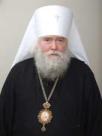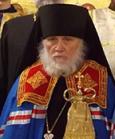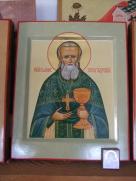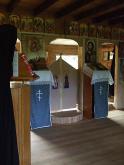Monday, August 10, 2015
Abbess Alexandra: About two Church Issues (conference report). Part 1
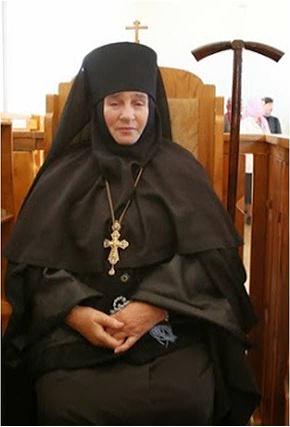 Part 1 of 2
Part 1 of 2
Today I would like to raise some questions concerning the life of the Church. It may seem strange that I say this: These are simple truisms. However, these topics are some that constantly worry us (i.e. members of the Orthodox Church, the sisters of our monastery, and myself). Therefore I cannot avoid speaking about this. The first question concerns Holy Communion.
It happens that people come to our monastery from the Kiev or Moscow Patriarchate. What do we do if they wish to partake of the Holy Mysteries? We know that in Russia, there are very few parishes of the Church Abroad. Many of our relatives and friends go to the Moscow Patriarchate, because they have nowhere else to go. They understand where the truth is, but are unable to go to any parish of the Church Abroad.
There is another type of people who go to the Moscow Patriarchate, and do not particularly think about any differences we might have with it. For them, the Church is simply a tribute to tradition. This problem is not new. Already in 1979, Metropolitan Filaret stated well about a similar situation:
“What does it mean that many of the “orthodox” are indifferent to which Church they attend? It means simply that the truth is not dear to people. That is why they do not particularly think about these things. “They serve in the same way, everything is the same - why complicate matters unnecessarily?” Or, as father archpriest John Storozhev in Harbin (the last spiritual father of the Royal Family), one of the best pastors in the diaspora, used to say with bitter irony: “The bells ring, the priests serve, they sing well - what else do we need?”. And then they add that familiar cliche: “After all, God is one!” … ” [1]
In a letter to an Abbess of one of our monasteries abroad which is visited by people of different jurisdictions, Metropolitan Filaret offers his solution:
“It seems clear to me that there can only be correct “missionary work” in the monastery when such visitors are allowed into the Church; however, admitted to the Mysteries with one condition: If they partake of the Mysteries here, they must abandon “the Mysteries” of the Churches of other jurisdictions.Otherwise - what will happen?! It will seem to them that everything is in order in those churches, and that they do not need to change or correct anything. By allowing them to receive the Mysteries without requiring unity and consistency in this regard, we would be confirming even more that they are completely correct, and that their way is a true and correct way. ” [2]
Vladyka Filaret’s stand is the position of our Church - there is no doubt about this. However, in practice it often happens that priests act differently. Whether we like it or not, in such cases human attachments play a role. For example, relatives or friends of the priest may come from the MP, and it is difficult to deny them the Mysteries. Sometimes people who are far from the Church come, while finding themselves in a difficult situation in life. There is a desire to help, rather than push a person away. For such a person, the differences between the Russian Orthodox Church Abroad and the MP recede, not only to the secondary, but even the tenth level in comparison with the experiences of his broken life. Such a man has no desire to delve into religious matters. Therefore, the question of receiving Communion or not is approached on an individual basis, depending on the priest and the circumstances. Maybe some of you in the audience can share your experiences in addressing such situations.
Today, the situation is further complicated for the faithful, in that the Church is used for political purposes. Here is one example:
“On February 12th, during the truce between the government and the opposition organization “Ukrainian National Council” (chairman Igor Druz), an initiative in support of the “MVD Berkut” special forces was carried out. This division is protecting the government quarter from Grushevsky Street from the protesters at the Euromaidan. Representatives of “political orthodoxy” brought Archpriest Alexei Yefimov, rector of the Church of Saint Anthony and Theodosius of Kiev (of the Vasilkov diocese of the Ukrainian Orthodox Church (Moscow Patriarchate), in order to serve a moleben service, and commune the Special Forces soldiers with the Blessed Sacrament (of the the body and blood of Christ).” [3 ]
At present, there is a war in the Ukraine. Among the soldiers there are also priests who serve services, and, if necessary - baptise, administer communion, and bury those who have died. Again the question arises: To whom can the priest administer the Mysteries (perhaps in conditions of mortal danger)? Indeed, among those who are fighting there are members of our Church, as well as Greek Catholics, people of the Ukrainian Patriarchate, people from the Moscow Patriarchate, and people far from the Church. How do we avoid breaking the commandment of love in such a situation?
All the Holy Mysteries (and especially so, Holy Communion) - are a matter of conscience for each Orthodox person. This is when we speak of lay people who go to various churches, while not making any effort to sort out where the truth is. Yet, even among monastics there are some who, change their jurisdiction under the influence of external circumstances. They do this while knowing full well where the truth is. I do not want to condemn anybody: this is a matter of each person’s conscience..
In the Holy Land, I came across old nuns who have lived for a long time in the monasteries abroad. After these monasteries joined the Moscow Patriarchate, they came under its omophorion. They do not support this union, but for various reasons can not leave the monastery where they have lived for so long. To leave a monastery for an elderly person is not so simple. Old age and illnesses object. Also, if they attempt to move to another country for permanent residence they have difficulties obtaining the necessary documents. In such cases, elderly persons tend to lose any social benefits they might have held previously. Many do not have the heart to give up everything and live in a foreign country, leaving behind their native monastery and relatives. Therefore, many of the older nuns have made peace with the lies, they go to the service and partake of Holy Communion in the Moscow Patriarchate. As they told me, during the commemoration of Patriarch Kirill, they stop up their inner spiritual ears. They say: “We do not pray for the patriarch”. Nevertheless, we understand that receiving Holy Communion in the Moscow Patriarchate makes all the communicants united in spirit, whether they like it or not.
Some of the nuns, who have had no opportunity to leave after the union with the MP, continue to live in their monastery and attend the services, but do not commune in the Moscow Patriarchate. For Holy Communion they go to the Church Abroad, whenever the opportunity presents itself.
For a long time I thought that only the sacraments separated us from the Moscow Patriarchate. Therefore I assumed that it was permissible to pray in the churches of the MP, in the case when it is not possible to attend a service in a parish of the Church Abroad. I have been on pilgrimages to the holy places of Moscow, St. Petersburg and Kiev. In Moscow, for example, I greatly enjoyed visiting the Donskoy, Danilov, and Novo-Spassky monasteries, as well as the Trinity-Sergius Lavra. If I visited on Sundays or feast days I would go to these monasteries for services. Of course, I did not take communion, but simply prayed. However, there was an event that showed me my error.
At that time, our monastery moved to the Ukraine, and we had already built our new church. I needed to go to Kiev, to the Kiev-Pechersk Lavra in order to buy church vessels. I asked one of our priests to accompany me. We left on a Friday and were due to return Sunday evening. We stayed with friends. On Saturday, while we were getting ready to leave, I asked the father why he did not put on a Cross. I was intending to attend the service at the Lavra. Batiushka answered that he had all the necessary books with him, and was going to pray somewhere near the caves. “I do not want to impose my views on you - it is your business. But for me, praying together in a church of the Moscow Patriarchate is impossible. This is not my personal opinion - this is the position of our church, ” the priest explained to me. I was embarrassed and ashamed of my lack of understanding. We prayed on the banks of the Dnieper. On that wonderful evening, I realised my long-held misconception. Everything fell into place. I realised that we are not able to attend the services in a church of the Moscow Patriarchate or any other jurisdiction, because we can not engage with them in common prayer, for this is a mystery in front of God.
I remember an incident that occurred with one of our priests in America. He was a priest of Jewish origin. His name was Father Elias. In his old age, he had become very frail, and his Jewish relatives put him in a Jewish nursing home. Father Elias was starting to lose his memory and sometimes did not recognize his loved ones. Before Christmas one of our priests, father Peter, who knew this father Elias, decided to visit him and commune him with the Holy Mysteries. Father Elias was very happy for father Peter’s arrival, and they spoke together very nicely. “Now, father Elias, why don’t you confess, and I will give you the Holy Mysteries,” - said father Peter. On hearing this proposal, father Elias became alarmed and answered: “I am very glad that you came to see me, but I cannot receive Holy Communion. I am a priest of the Church Abroad, and I do not know which Church you are from.” “But you know me - I am father Peter, I am also of the Church Abroad,” father Peter tried to convince his companion. “Yes, I remember you, but I do not know which church you are from. I have to consult with Vladyka Filaret,” continued father Elias. By that time, Vladyka Filaret had died, and Vladyka Vitaly was Metropolitan. Nevertheless, father Elias went to the telephone and dialed a number, and then began to speak.
Father Peter, who witnessed this wonderful conversation, told me that he had goose bumps when he saw firsthand that father Elias received instructions and answers to his questions from Vladyka Filaret. Father Elias prayed for Vladyka Filaret as living, and to him the Bishop was still alive. This elderly priest, not putting any trust in himself, took the blessing of his abba, connecting with him in spirit and in truth. And how could his soul, so full of humility not receive a blessing to receive the Holy Mysteries? “It was a miracle!” exclaimed father Peter when recalling the incident. When father Elias ended the conversation, he hung up and said cheerfully: “Metropolitan Filaret blessed. Let’s begin the Mystery (of Communion).”
This unusual case illustrates what should be the correct attitude to the sacraments of confession and communion. In all matters of contention we need to ask the Bishop’s blessing.
Abbess Alexandra
Part 2 to follow
[1] St. Filaret Voznesensky. Letter to an Abbess. November 26 / December 9, 1979
[2] St. Filaret Voznesensky. Letter to an Abbess. November 26 / December 9, 1979
[3] Religion in Ukraine, of 02.13.2014
